the 形容词比较级 , the形容词比较级的用法
加the与不加the

用在表示乐器的名词之前加the,运动类的不用play the piano,play football1.与单数名词连用表示一类事物,如the dollar 美元; the fox 狐狸;或与形容词或分词连用,表示一类人:the rich 富人; the living 生者。
2.与复数名词连用,指整个群体。
冠词the的用法 1.特指某(些)人或某(些)物,这是定冠词的基本用法。
Beijing is the capital of China. 北京是中国的首都。
2.指谈话双方都知道的人或事物。
Open the window please. 请把窗户打开。
(双方都知道指的是哪一扇窗户) 3.指上文已经提到的人或事物。
There was a chair by the window. On the chair sat a young woman with a baby in her arms. 窗户附近有一把椅子。
椅子上坐着一位年轻妇女,怀里抱着一个婴儿。
4.指世界上独一无二的事物。
Which is the biggest, the sun, the earth or the moon? 太阳、地球和月亮哪一个最大? 5.用在序数词、形容词最高级前。
The first truck is carrying a few baskets. 第一辆卡车装运一些筐。
一、the在形容词前的用法 1. the与某些形容词连用,使形容词名词化,相当于复数的普通名词,表示一类人。
例如:the young青年the old老年the poor穷人the rich富人the sick病人 2. the后面接形容词,相当于抽象名词。
例如:the true真理,真实the false假the sublime 崇高the unusual不寻常the beautiful优美 3. the用于形容词的比较级前,表示两者中的一个"较……"、"更……"、"最……。
the+比较级的用法
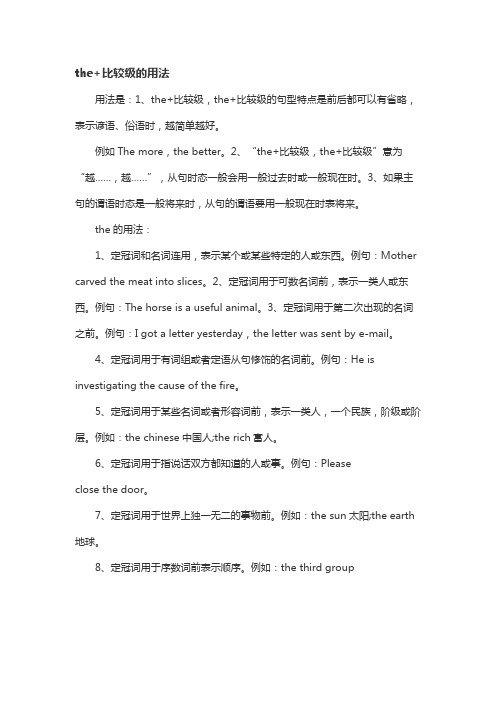
the+比较级的用法
用法是:1、the+比较级,the+比较级的句型特点是前后都可以有省略,表示谚语、俗语时,越简单越好。
例如The more,the better。
2、“the+比较级,the+比较级”意为“越……,越……”,从句时态一般会用一般过去时或一般现在时。
3、如果主句的谓语时态是一般将来时,从句的谓语要用一般现在时表将来。
the的用法:
1、定冠词和名词连用,表示某个或某些特定的人或东西。
例句:Mother carved the meat into slices。
2、定冠词用于可数名词前,表示一类人或东西。
例句:The horse is a useful animal。
3、定冠词用于第二次出现的名词之前。
例句:I got a letter yesterday,the letter was sent by e-mail。
4、定冠词用于有词组或者定语从句修饰的名词前。
例句:He is investigating the cause of the fire。
5、定冠词用于某些名词或者形容词前,表示一类人,一个民族,阶级或阶层。
例如:the chinese中国人;the rich富人。
6、定冠词用于指说话双方都知道的人或事。
例句:Please
close the door。
7、定冠词用于世界上独一无二的事物前。
例如:the sun太阳;the earth 地球。
8、定冠词用于序数词前表示顺序。
例如:the third group。
形容词副词的比较级和最高级与用法
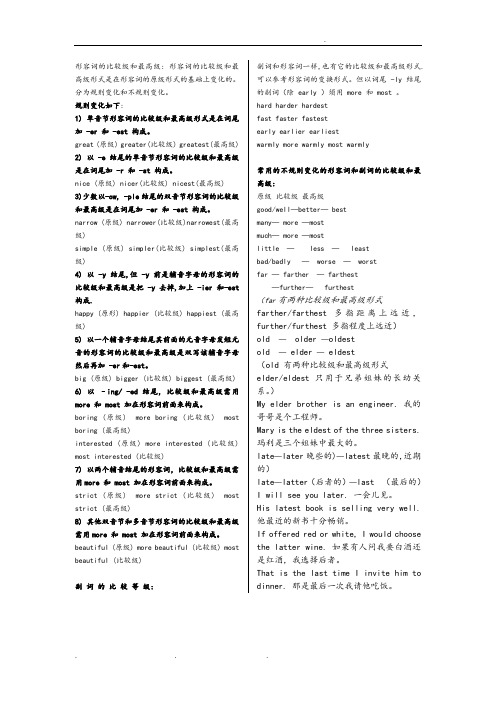
形容词的比较级和最高级: 形容词的比较级和最高级形式是在形容词的原级形式的基础上变化的。
分为规则变化和不规则变化。
规则变化如下:1) 单音节形容词的比较级和最高级形式是在词尾加 -er 和 -est 构成。
great (原级) greater(比较级) greatest(最高级) 2) 以 -e 结尾的单音节形容词的比较级和最高级是在词尾加 -r 和 -st 构成。
nice (原级) nicer(比较级) nicest(最高级)3)少数以-ow, -ple结尾的双音节形容词的比较级和最高级是在词尾加 -er 和 -est 构成。
narrow (原级) narrower(比较级)narrowest(最高级)simple (原级) simpler(比较级) simplest(最高级)4) 以 -y 结尾,但 -y 前是辅音字母的形容词的比较级和最高级是把 -y 去掉,加上 -ier 和-est 构成.happy (原形) happier (比较级) happiest (最高级)5) 以一个辅音字母结尾其前面的元音字母发短元音的形容词的比较级和最高级是双写该辅音字母然后再加 -er和-est。
big (原级) bigger (比较级) biggest (最高级) 6) 以–ing/ -ed结尾, 比较级和最高级需用more 和 most 加在形容词前面来构成。
boring (原级) more boring (比较级) most boring (最高级)interested (原级) more interested (比较级) most interested (比较级)7) 以两个辅音结尾的形容词,比较级和最高级需用more 和 most 加在形容词前面来构成。
strict (原级) more strict (比较级) most strict (最高级)8) 其他双音节和多音节形容词的比较级和最高级需用more 和 most 加在形容词前面来构成。
比较级用法归纳
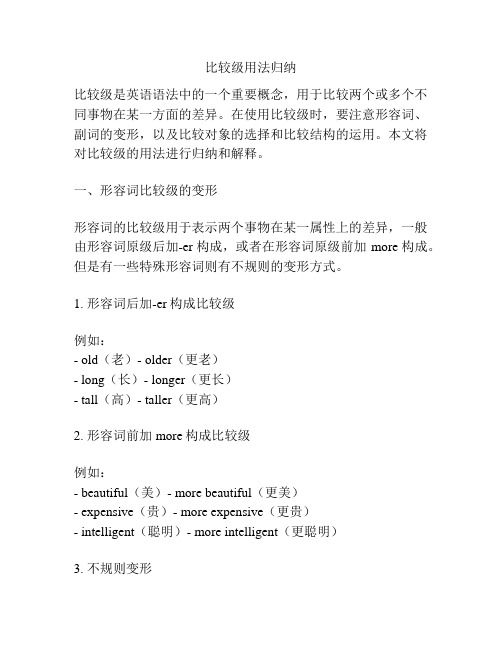
比较级用法归纳比较级是英语语法中的一个重要概念,用于比较两个或多个不同事物在某一方面的差异。
在使用比较级时,要注意形容词、副词的变形,以及比较对象的选择和比较结构的运用。
本文将对比较级的用法进行归纳和解释。
一、形容词比较级的变形形容词的比较级用于表示两个事物在某一属性上的差异,一般由形容词原级后加-er构成,或者在形容词原级前加more构成。
但是有一些特殊形容词则有不规则的变形方式。
1. 形容词后加-er构成比较级例如:- old(老)- older(更老)- long(长)- longer(更长)- tall(高)- taller(更高)2. 形容词前加more构成比较级例如:- beautiful(美)- more beautiful(更美)- expensive(贵)- more expensive(更贵)- intelligent(聪明)- more intelligent(更聪明)3. 不规则变形有一些形容词有一些不规则的变形方式,需要特别记忆,例如:- good(好)- better(更好)- bad(坏)- worse(更坏)- little(小)- less(更少)- many/much(多)- more(更多)二、副词比较级的变形副词的比较级变形方式和形容词类似,一般在副词后加-er,或者在副词前加more。
同样,也有一些特殊的副词比较级变形方式。
1. 副词后加-er构成比较级例如:- fast(快)- faster(更快)- soon(快)- sooner(更快)- late(晚)- later(更晚)2. 副词前加more构成比较级例如:- carefully(小心地)- more carefully(更小心地)- slowly(慢慢地)- more slowly(更慢慢地)- quietly(安静地)- more quietly(更安静地)3. 不规则变形有一些副词的比较级变形方式也是不规则的,例如:- well(好)- better(更好)- badly(糟糕地)- worse(更糟糕地)- little(少)- less(更少)- much(多)- more(更多)三、比较对象的选择在使用比较级时,需要选择适当的比较对象,即被比较的事物或者人。
形容词比较级句型

形容词比较级句型是用来比较两个事物的相对程度或差异的句型。
以下是一些常见的形容词比较级句型:
1. 比较级+than:这是最基本的比较级句型,用于将一个事物与另一个事物进行比较。
例如:She is taller than him.(她比他高。
)
2. The+比较级,the+比较级:这个句型表示“越……,越……”。
例如:The more you practice, the better you will become.(你练习得越多,你就会变得越好。
)
3. 比较级+and+比较级:这个句型表示“越来越……”。
例如:The weather is getting warmer and warmer.(天气越来越暖和了。
)
4. As+形容词原级+as:这个句型表示“和……一样”。
例如:She is as tall as him.(她和他一样高。
)
5. Not as/so+形容词原级+as:这个句型表示“不如……”。
例如:He is not as smart as his sister.(他不如他的姐姐聪明。
)
需要注意的是,有些形容词的比较级形式是不规则的,需要特别记忆。
例如:good-better, bad-worse, far-further等。
比较级用法
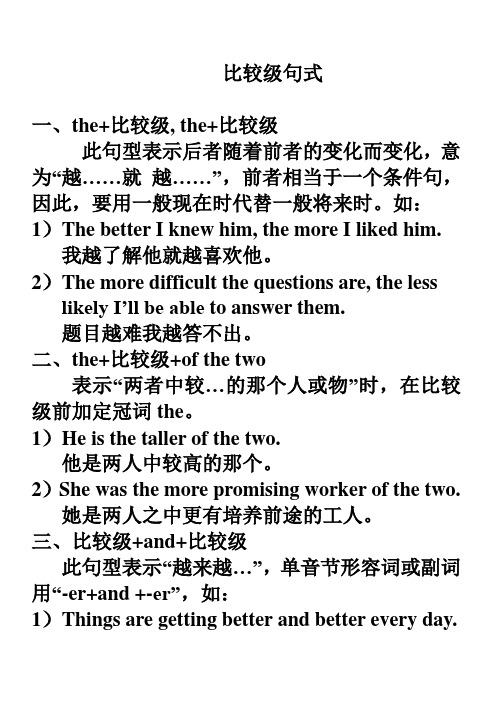
比较级句式一、the+比较级, the+比较级此句型表示后者随着前者的变化而变化,意为“越……就越……”,前者相当于一个条件句,因此,要用一般现在时代替一般将来时。
如:1)The better I knew him, the more I liked him.我越了解他就越喜欢他。
2)The more difficult the questions are, the less likely I’ll be able to answer them.题目越难我越答不出。
二、the+比较级+of the two表示“两者中较…的那个人或物”时,在比较级前加定冠词the。
1)He is the taller of the two.他是两人中较高的那个。
2)She was the more promising worker of the two.她是两人之中更有培养前途的工人。
三、比较级+and+比较级此句型表示“越来越…”,单音节形容词或副词用“-er+and +-er”,如:1)Things are getting better and better every day.情况一天天好起来。
2)It’s becoming more and more difficult to finda job.找工作越来越困难了。
3)Holiday nights are getting less and less expensive.假日机票越来越便宜了。
四、not +比较级+ than / no +比较级+ than比较级前加not,表示前者不如后者,与not as…as相当;比较级前加no是对两者的否定,意为“和……一样不……”,与neither…nor…或“as+相反意义的形容词或副词+as”相当。
如:1)He is not taller than me. 他不如我高。
2)He is no taller than me. 他同我一样不高。
形容词比较级的用法和句型总结

形容词比较级的用法和句型总结一、形容词比较级的基本用法形容词比较级是英语中表示程度高低差异的一种手段,用于对两个或多个事物进行比较。
形容词比较级通常由形容词的原级加上后缀“-er”构成(如taller),或在原级之前加上副词more构成(如more beautiful)。
1. 比较两者:A is + 比较级 + than B例如:“She is taller than her sister.”(她比她妹妹高。
)2. 表示最高程度:A is the + 最高级例如:“This is the most beautiful flower I have ever seen.”(这是我曾经见过的最美丽的花。
)3. 修饰名词时,在名词前放置不定冠词“a/an”或者定冠词“the”,再加上比较级例如:“I bought a bigger house last month.”(我上个月买了一座更大的房子。
)二、特殊情况下的形容词比较级用法及变化规则1. 形容词以字母“e”结尾时,只需要在末尾直接添加“r”构成比较级,并去掉末尾的“e”例如:nice – nicer(好 - 更好)2. 形容词以辅音字母+y结尾时,将“y”变为“i”,再添加“er”构成比较级例如:happy – happier(快乐 - 更快乐)3. 形容词以一个元音字母加上一个辅音字母结尾时,要双写末尾的辅音字母,并添加“er”构成比较级例如:big – bigger(大 - 更大)4. 部分形容词的比较级是不规则的,需要记忆例如:good – better(好 - 更好), bad – worse(坏 - 更坏)三、常见的形容词比较级句型1. 比较级 + and + 比较级该句型表示程度的加强,相当于中文中常用的重复表达形式。
例如:“The more you practice, the better you will become.”(你练习得越多,进步就会越大。
形容词比较级和最高级

形容词比较级和最高级l 形容词比较级:两个人或事物的比较,或使用than 来进行比较,特点是在形容词后加er,1. 规则变化:1). 直接加―er‖:tall---taller2).有e加―r‖:nice---nicer fine—finerlate---later3)双写的有:hot --- hottersad---sadderbig---biggerwet--- wetterred --- redderfat-----fatterthin---- thinner4)将y 改为i, 再加erdirty---dirtierdry ----drierhappy--- happierheavy--- heaviersunny—sunnierwindy--- windierrainy--- rainierugly—uglier丑陋的pretty--- prettier漂亮的easy--- easierlazy --- lazier懒的5).加more 表示比较的有expensivebeautifuldifficult (困难的)delicious美味的careful (小心的)lovely(可爱的) 特殊interesting(有趣的)important (重要的)helpful(有帮助的) dangerous(危险的)wonderful (精彩的)useful(有用的)2. 不规则的变化:good /well--- better bad--- worse many/ much---more (更多的)little(少的)—less(较少的) far ---- farther ( further) 远的更远的l 副词的比较级:1. 几个常见的副词(方式副词):fast slow high low early late far well (好)hard (努力地) loud(大声地) 2.例句:He draws better than me.(副词) (well)He is better than me at drawing.(good) (形容词)Who runs faster, Jenny or Lisa? He jumps higher than me.He goes to school earlier than me. He works harder than me.l 季节月份及天气在比较级中的用法:1. It’s hotter in August than in June.= August is hotter than June.2. The weather in Harbin is colder than that in Guangzhou.3. Fall is windier than spring.l 比较级的其他用法:1. much , a little , even+比较级(… 得多, 一点, 甚至)Beijing is much bigger than Jiangmen. 北京比江门大得多.The apple is a little bigger than the pear.2. 倍数: times + 形比+ thanOur room is twice bigger than theirs. 我们的房间比他们的大两倍.The Yangzi River is ten times longer than the river in our city. 长江比我们城市的河长十倍.3. ―大三岁, 高两厘米‖:I am three years older than you. 我比你大三岁.He is two cm taller than me.他比我高两厘米.4.比较+and+比较,―越来越…‖The earth is getting warmer and warmer. 地球变得越来越暖和.Our city is more and more beautiful .5. a. than + any other +单数名词= 最高级b. than + (the) + other + 名词复数= 最高级a例句:This watch is more expensive than any other watch in the shop. 在这店里,这块手表比其他任何一个别的表都贵.(这块表是最贵的).= This watch is the most expensive in the shop.b例句:This watch is more expensive than other watches in the shop.= This watch is the most expensive in the shop.6. the 比较级, the 比较级―越…就越…‖The busier he is, the happier he feels.他越忙就越感到高兴.l 形容词的原级:句型: A+ be+ as+形容词原级+as + BHe is as tall as me. 他和我一样高.(两者程度一样)否定句:A+ be+ not+ as (so)+形容词原级+as +BHe is not as (so) tall as me. 他不如我高. 表示两者程度不同, A不如B…= He is shorter than me.l 形容词最高级:1. of 和in 的区别of+复数, 例如: of the three of all (people) of all the boys of us of all thingsin + 范围, 场所in the house in the world in China in my family in our school2. 需要注意的形容词最高级:a. one of the + 最高级+ 复数名词, 表示―最…之一者‖例:Shanghai is one of the most beautiful cities in <st1:country-region w:st="on">China. 上海是中国最美丽的城市之一。
比较级表最高级的用法归纳
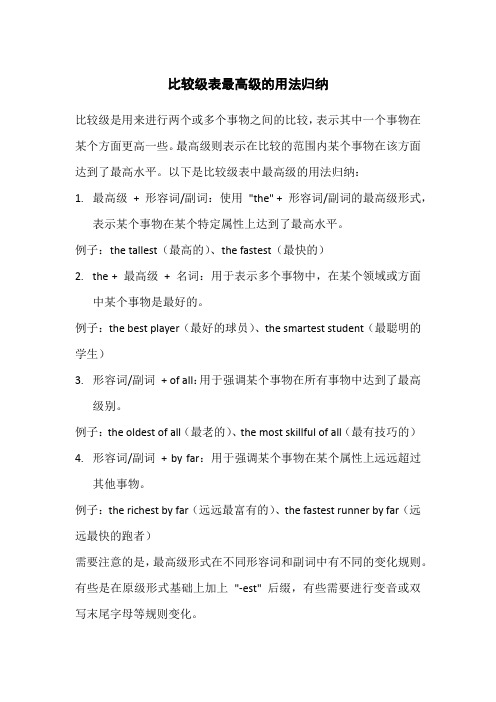
比较级表最高级的用法归纳
比较级是用来进行两个或多个事物之间的比较,表示其中一个事物在某个方面更高一些。
最高级则表示在比较的范围内某个事物在该方面达到了最高水平。
以下是比较级表中最高级的用法归纳:
1.最高级+ 形容词/副词:使用"the" + 形容词/副词的最高级形式,
表示某个事物在某个特定属性上达到了最高水平。
例子:the tallest(最高的)、the fastest(最快的)
2.the + 最高级+ 名词:用于表示多个事物中,在某个领域或方面
中某个事物是最好的。
例子:the best player(最好的球员)、the smartest student(最聪明的学生)
3.形容词/副词+ of all:用于强调某个事物在所有事物中达到了最高
级别。
例子:the oldest of all(最老的)、the most skillful of all(最有技巧的)4.形容词/副词+ by far:用于强调某个事物在某个属性上远远超过
其他事物。
例子:the richest by far(远远最富有的)、the fastest runner by far(远远最快的跑者)
需要注意的是,最高级形式在不同形容词和副词中有不同的变化规则。
有些是在原级形式基础上加上"-est" 后缀,有些需要进行变音或双写末尾字母等规则变化。
同时,需要根据具体语境和比较对象选择合适的最高级表达方式。
这些用法可以根据实际需要进行灵活运用。
the后面加什么词性

the后面加什么词性the是定冠词,其后一般加名词、数序词、形容词比较级和过去分词等。
the,作定冠词时意为“这;那”,作副词时意为“更加(用于比较级,最高级前)”。
一、定冠词the用法1.用以特指某(些)人或某(些)事物。
2.用于指谈话双方都明确所指的人或事物。
3.用以复述上文提过的人或事物(第一次提到用“a或an”,以后再次提到用“the”)。
4.用在序数词和形容词最高级前。
5.表示世界上宇宙中独一无二的事物。
6.指由普通名词构成专有名词。
7.表示方向、方位。
8.在海洋、江河、湖泊、山脉、海峡、海湾等地理名词前。
9.在姓氏复数前,表示一家人。
10.和某些形容词连用,使形容词名词化,代表一类人或物。
11.用在表示阶级、政党的名词前。
12.用在the very强调句中。
13.固定用法。
14.表示演奏乐器时,乐器的前面要加the。
15.某些固定的表达法。
二、the双语例句1.I could come next week, or the week after.我可能下周来,或者再下一周。
2.I called several times, but only got the answering machine.我打了几次电话,但只有电话答录机答话。
3.The gene is activated by a specific protein.这种基因由一种特异性蛋白激活。
4.She added a PS asking me to water the plants.她加了一句附言,要我浇花。
5.The course is 1 year FT, 2 years PT.该课程全日制学习一年,非全日制学习两年。
6.He didn't give an adequate answer to the question.他没有对这个问题作出满意的答复。
the+比较级的用法

the+比较级的用法一、基础比较级的用法比较级是英语中一种常见的语法形式,用于表达两个事物之间的比较关系。
它可以用来表示两者在某个特定方面的程度、大小、质量等方面的差异。
而使用比较级时需要注意动词、形容词和副词前缀的变化。
下面将详细介绍基础比较级的用法。
1. 形容词与副词的比较级形容词和副词在进行比较时,通常要加上-er后缀或在单音节的情况下加上-more前缀,例如:- The red car is faster than the blue car.(红色汽车比蓝色汽车快。
)- He speaks more fluently than his brother.(他说话比他弟弟更流利。
)同时,对于以-e结尾的形容词或副词,则只需加上-r后缀即可,例如:nice (好)→ nicer(更好)。
2. 重读双音节及多音节形容词与副词的变化对于重读双音节及多音节形容词和副词,在其前面加上more来表示比较级,例如:- This painting is more beautiful than that one.(这幅画比那幅画更漂亮。
)- She sings more beautifully than her sister.(她唱歌比她姐姐更动听。
)3. 不规则比较级形式部分形容词和副词的比较级变化非常特殊,需要记忆它们的不规则形式。
一些常见的不规则比较级包括:- good(好)→ better(更好)- bad(坏)→ worse(更糟)- far(远)→ farther/further(更远)二、高级比较级的用法除了基础比较级之外,英语中还存在一种加强程度的比较级形式,称为高级比较级或绝对比较级。
它在表达程度上进一步强调了事物之间的差异。
下面将介绍高级比较级的用法。
1. 形容词和副词前缀变化在使用高级比较级时,需要在形容词或副词前添加 most 或者与其对应的前缀来表示增加了程度上的差异,例如:- This is the most interesting book I've ever read.(这是我读过最有趣的书。
the 比较级…the 比较级…”的用法
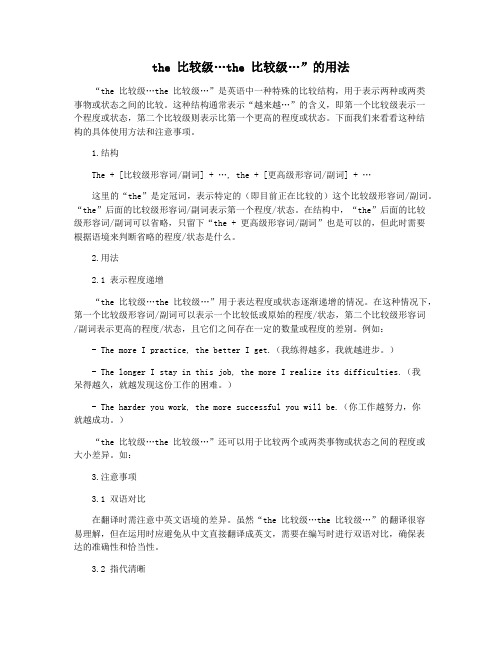
the 比较级…the 比较级…”的用法“the 比较级…the 比较级…”是英语中一种特殊的比较结构,用于表示两种或两类事物或状态之间的比较。
这种结构通常表示“越来越…”的含义,即第一个比较级表示一个程度或状态,第二个比较级则表示比第一个更高的程度或状态。
下面我们来看看这种结构的具体使用方法和注意事项。
1.结构The + [比较级形容词/副词] + …, the + [更高级形容词/副词] + …这里的“the”是定冠词,表示特定的(即目前正在比较的)这个比较级形容词/副词。
“the”后面的比较级形容词/副词表示第一个程度/状态。
在结构中,“the”后面的比较级形容词/副词可以省略,只留下“the + 更高级形容词/副词”也是可以的,但此时需要根据语境来判断省略的程度/状态是什么。
2.用法2.1 表示程度递增“the 比较级…the 比较级…”用于表达程度或状态逐渐递增的情况。
在这种情况下,第一个比较级形容词/副词可以表示一个比较低或原始的程度/状态,第二个比较级形容词/副词表示更高的程度/状态,且它们之间存在一定的数量或程度的差别。
例如:- The more I practice, the better I get.(我练得越多,我就越进步。
)- The longer I stay in this job, the more I realize its difficulties.(我呆得越久,就越发现这份工作的困难。
)- The harder you work, the more successful you will be.(你工作越努力,你就越成功。
)“the 比较级…the 比较级…”还可以用于比较两个或两类事物或状态之间的程度或大小差异。
如:3.注意事项3.1 双语对比在翻译时需注意中英文语境的差异。
虽然“the 比较级…the 比较级…”的翻译很容易理解,但在运用时应避免从中文直接翻译成英文,需要在编写时进行双语对比,确保表达的准确性和恰当性。
the的用法顺口溜

the的用法顺口溜"the"的用法顺口溜:1. The用于特指名词前,指已知、被提到的人或物。
如:The dog barks at the cat.2. 指一类人或物时,带上the。
如:The lion is a king of the animals.3. 世界上独一无二,用the。
如:The sun is shining brightly today.4. The用于特指一些国家或地区。
如:The United States is a powerful nation.5.引导特指的形容词比较级或最高级。
如:This is the best book I have ever read.6. 地点上有广义的the。
如:He went to the hospital.7. 群体用the。
如:The poor need our help.8. 具体事物引出抽象概念,用the。
如:We should protect the environment.9. 特指时间段,用the。
如:I will see you in the morning.10. 表示“整个人群”,用the。
如:The young shouldn't be underestimated.11. 表示“特定人群”,用the。
如:The elderly need healthcare support.12. 表示乐器时,前面加上the。
如:He is playing the guitar.13. 表示海洋、湖泊、河流时,前面加上the。
如:He swam in the river.14. 表示方位及方向时,常用the。
如:She lives on the east coast.15. 用在乐团或乐队名称前时,加上the。
如:I love listening to The Beatles.16. 用在部分专有名词前时,加上the。
形容词的比较级与最高级用法详解
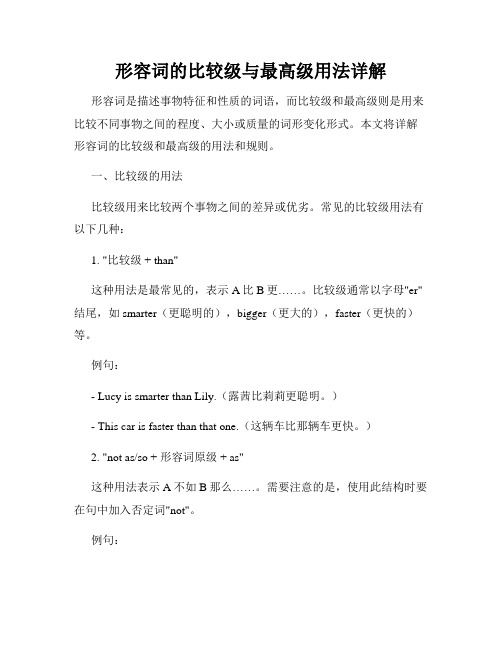
形容词的比较级与最高级用法详解形容词是描述事物特征和性质的词语,而比较级和最高级则是用来比较不同事物之间的程度、大小或质量的词形变化形式。
本文将详解形容词的比较级和最高级的用法和规则。
一、比较级的用法比较级用来比较两个事物之间的差异或优劣。
常见的比较级用法有以下几种:1. "比较级 + than"这种用法是最常见的,表示A比B更……。
比较级通常以字母"er"结尾,如smarter(更聪明的),bigger(更大的),faster(更快的)等。
例句:- Lucy is smarter than Lily.(露茜比莉莉更聪明。
)- This car is faster than that one.(这辆车比那辆车更快。
)2. "not as/so + 形容词原级 + as"这种用法表示A不如B那么……。
需要注意的是,使用此结构时要在句中加入否定词"not"。
例句:- This book is not as interesting as that one.(这本书不如那本书有趣。
)- He is not as tall as his brother.(他不如他哥哥高。
)3. "形容词比较级 + and + 形容词比较级"这种用法表示A和B在某一方面都比较……。
例句:- The weather today is colder and windier than yesterday.(今天的天气比昨天更冷,更有风。
)- This car is faster and more fuel-efficient than the previous model.(这辆车比以前的型号更快,更省油。
)二、最高级的用法最高级用来表示三个或三个以上事物之间的比较,强调某事物在同类中的程度最高。
常见的最高级用法如下:1. "the + 形容词最高级"最高级通常以字母"est"结尾。
the比较级…,the比较级…”的用法

“ the more …,the mor的用法(1)“the more…,themore句型为“the形容词或副词比较级,the+比较级”结构,常表示越……就越.. ,是一个复合句,其中前面的句子是状语从句,后面的句子是主句。
The more he gets,the more he wa nts他越来越贪(他得到的越多,就越想要)。
The more she lear ns,the more she wan ts to lear n 她越学就越想学。
(2)“the比较级,the+比较级”句型主从句的时态常用一般现在时或一般过去时。
The harder he worked, the more he got他工作越努力,得到的就越多。
( 3)若主句的谓语动词用一般将来时,从句的谓语动词要用一般现在时表示将来。
The harder you work,the greater progress you will make 你越用功,进步就越大。
The Ion ger the war lasts,the more the people there will suffer.战争持续越久,那里的人们受难就越多。
( 4)在这种句型中,主句在程度上随着从句变化而变化,常把被强调的部分提前。
The faster you run, the better it will be. 你跑得越快越好。
( 5)这种句型的特点是前后都可以有所省略,特别是谚语、俗语,只要意义明确,越简单越好。
The more, the better. 多多益善。
The sooner, the better .越早越好。
(6)这种句型中的比较部分通常是状语、宾语、表语,也可以是主语The more English you practice,the better your En glish is.你练习英语越多,你的英语就越好。
The busier he is,the happier he feels他越忙越高兴。
形容词的比较级与最高级的用法
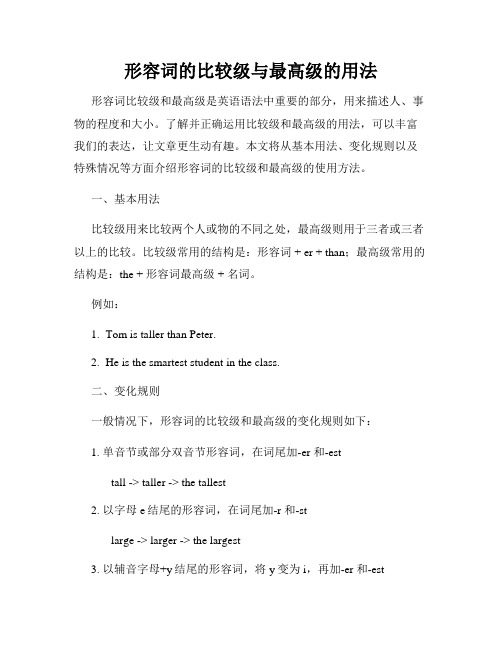
形容词的比较级与最高级的用法形容词比较级和最高级是英语语法中重要的部分,用来描述人、事物的程度和大小。
了解并正确运用比较级和最高级的用法,可以丰富我们的表达,让文章更生动有趣。
本文将从基本用法、变化规则以及特殊情况等方面介绍形容词的比较级和最高级的使用方法。
一、基本用法比较级用来比较两个人或物的不同之处,最高级则用于三者或三者以上的比较。
比较级常用的结构是:形容词 + er + than;最高级常用的结构是:the + 形容词最高级 + 名词。
例如:1. Tom is taller than Peter.2. He is the smartest student in the class.二、变化规则一般情况下,形容词的比较级和最高级的变化规则如下:1. 单音节或部分双音节形容词,在词尾加-er 和-esttall -> taller -> the tallest2. 以字母e结尾的形容词,在词尾加-r 和-stlarge -> larger -> the largest3. 以辅音字母+y结尾的形容词,将y变为i,再加-er 和-esthappy -> happier -> the happiest4. 多音节形容词或部分双音节形容词,在前面加more 和mostbeautiful -> more beautiful -> the most beautiful特殊情况的变化规则如下:1. 单音节或部分双音节形容词,以辅音字母+y结尾的形容词,如果前面有元音字母,则直接加-er 和-estgray -> grayer -> the grayest2. 以重读闭音节结尾,并且末尾只有一个辅音字母的形容词,则需双写辅音字母,再加-er 和-esthot -> hotter -> the hottest3. 部分双音节形容词和多音节形容词形式副词的形容词,则在前面加more 和mostcarefully -> more carefully -> the most carefully三、用法注意事项1. 形容词比较级和最高级与than 连用,表示与其他人或物相比的差异。
比较级的特殊用法
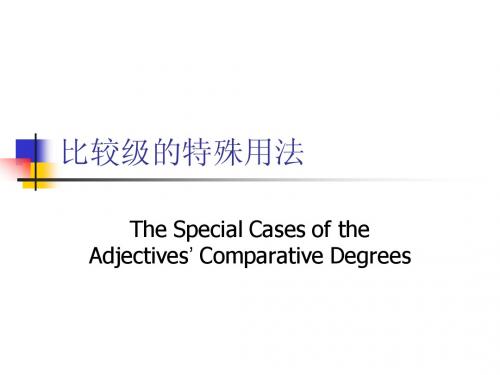
more or less 大体上,或多或 少
The work is more or less finished. 工作 大体算完成了。 Most of them came here to near money, more or less Mr.Wang worked for his cause.他们大都来挣钱的,但王先生有点 像为事业而工作。
5."no more...than..."="not...any more than..."意为"与……同样不 是,与……一样不"。
He is no wiser than me. 我和她一样不满意。
6."not more...than"意为"…… 没有……那样……"。
She was not more pleased than I was.
not much of 不是很好的
not much of a day 天气不是很好 He is more of a painter than I do.
2. 通常情况下,形容词或副词的比较级前 面都不加the,但若对两者进行比较,句中又 无than出现,则常用"the+比较级+of+比较 范围"结构。 His brother is the taller of the two boys. 他的弟弟是两个孩子中较高的那一个。
3. 使用比较级时要特别注意以 下几点。
He came all the way to China for promoting friendship _____ for making money. [A] other than [B] better than [C] more than [D] rather than He preferred to write the letter by hand _____ . [A] to typing it [B] than type it [C] to type it [D] rather than type it
- 1、下载文档前请自行甄别文档内容的完整性,平台不提供额外的编辑、内容补充、找答案等附加服务。
- 2、"仅部分预览"的文档,不可在线预览部分如存在完整性等问题,可反馈申请退款(可完整预览的文档不适用该条件!)。
- 3、如文档侵犯您的权益,请联系客服反馈,我们会尽快为您处理(人工客服工作时间:9:00-18:30)。
一、对主、从句的理解
The more I read the book,the more I liked it.
这本书我越看越喜欢。
The more difficult the questions are, the less likely he is able to answer them.
问题越难,他回答出来的可能性就越小。
The earlier you start,the sooner you’ll be back.
你出发得越早,回来得就越早。
The more you practise, the better you can understand.
你练习得越多,理解得就越透。
He is the busier, the happier he feels.
他越忙越高兴。
You climb the higher, the farther you will see.
你爬得越高,就看得越远。
The noisier they were, the happier was their mother.
孩子越吵闹,他们的母亲就越高兴。
The harder you work, the more progress you will get.
你越努力,进步就越快。
三、省略
1.在通常情况下,如果主、从句中的谓语动词是联系动词be,而且主语非代词时,此时be常常省略。
例如:
The better the food (is), the more popular a restaurant gets.
食物越可口,饭店的生意就越红火。
The higher the tree (is), the stronger the wind (is).
树大招风。
The more exercise you take, the stronger you are.
锻炼得越多,身体越强壮。
(注意:此句中的联系动词are不能省略。
)
2.对于主句在前,从句在后的特殊情况,主句中形容词或副词前的the常常省略。
例如:
You practise (the) more, the better you can understand.
你练习得越多,你理解得就越透。
I knew him (the) more, the more I liked him.
我越了解他就越喜欢他。
3.主、从句的主语和谓语动词在叙述的场合有默契,可酌情省略。
例如:
The sooner (you finish it), the better (it will be).
你完成得越快越好。
The more (you know), the more dangerous (it will be).
你知道得越多,处境就越危险。
